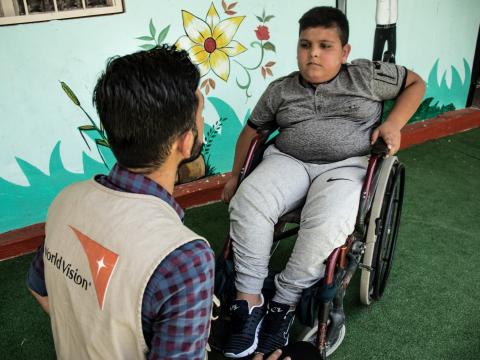“This helps him feel he's equal”

story and photos by Sacha Myers, Communications Specialist
Ali was doing what he loves when he was hit by a car.
One quiet afternoon when he was four, Ali was playing football with his friends when the ball rolled out on to the street. Ali chased the ball and the car didn’t stop in time.
The accident damaged Ali’s spinal cord, stealing the movement in his legs and forcing him into a wheelchair. Although Ali could go to a hospital in his hometown of Kirkuk in northern Iraq, the specialist who could have treated Ali was tragically killed by a terrorist shorty before the accident.
Ali’s father, Saddam, says his family’s life will never be the same again.
“The accident has changed our lives a lot because Ali needs special care. We need to provide him with everything. I have to take him every day to the school and bring him back. He cannot have a normal life like other children,” he says.
Ali’s disability meant it was very difficult for him to attend school: he couldn’t move around because of the stairs and the teachers did not know how to include him in all the activities. He often stayed home from school and felt depressed because he thought no one cared about him.
Schools in Iraq have suffered after years of conflict – funding is almost non-existent, and most schools do not provide quality education or cater for children with disabilities. As a result, many children like Ali get left behind or drop out.
With funding from UNICEF, World Vision is working with 48 schools across the Kirkuk region to improve the quality of education, increase social unity and help out-of-school children restart their education.
As part of the project, World Vision has set up student, parent and teacher groups in each school who develop and implement school improvement plans. Students have also been trained on their rights, roles and responsibilities, and teachers have been trained on classroom management and life skills.
Through the parent and teacher groups at Ali’s school, they identified ways to help him access the school and looked at how the teachers could provide more support.
“Ali had difficulties accessing the school because of the stairs. So, they (World Vision) added ramps and made a small garden for him,” Saddam says.
“Ali is brave. And he loves going to school. Especially after the garden was built for him. Even sometimes when it's raining heavily he still goes to school. He refuses to stay at home even though it's difficult for him. If he has a medical appointment he has to stay at home, otherwise he goes [to school] very day.”
“He loves sport because there is a teacher who pushes him while the other children are running and playing football. This helps him feel he's equal.”
Ali says it’s his teachers and his friends who motivate him to go to school every day.
“My best friend is Mohammed. I go to school because of Mohammed. He's always helping me by taking me out of the class to play outside and then back again,” he says.
“When the teacher gives a lesson using the white board and children have to go up and write on the board, the teacher will come and get me so I can write on the board too and then they take me back to my desk.”
“I go to school because I want to be able to read and write. I want to be a teacher. I love my teachers because they are good to me.”

